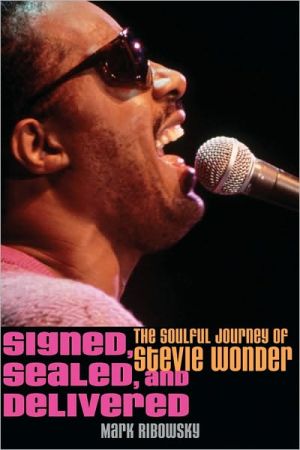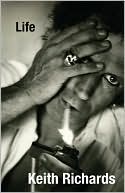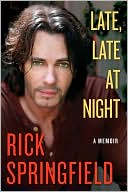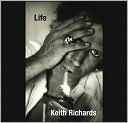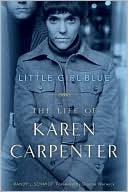Signed, Sealed, and Delivered: The Soulful Journey of Stevie Wonder
Praise for Mark Ribowsky\ "A dishy, insider look at Berry Gordy's making of the Supremes . . . Ribowsky nicely intersperses some hindsight reflections by the main players . . . In this engaging, vivacious account, Ribowsky energetically and thoroughly underscores the Supremes' significance as one of the first crossover successes."\ —Publishers Weekly on The Supremes: A Saga of Motown Dreams, Success, and Betrayal\ "Perfect . . . The virtue of Ribowsky's book is that he brings the story down...
Search in google:
What do you call a performer who stunned the music world at the age of twelve, who had No. 1 hit records before, during, and well after the Beatles were recording, and whose influence has helped shape everything from soul, funk, and hip-hop to disco and smooth jazz? What words do justice to a musical master whose thirty-four top-10 hits and twelve top-10 albums have won a record twenty-two Grammy Awards, and who, after a brilliant fifty-year career, continues to be one of the most dynamic and sought-after performers in the world? Only two words can describe a superstar of that caliber—Stevie Wonder. Signed, Sealed, and Delivered celebrates Stevie's sixtieth birthday with a full-fledged biography of this living, breathing musical genius and legend. Author Mark Ribowsky explores the life, achievements, and influence of one of America's biggest musical icons set against the history of Motown and the last fifty years of popular music. Drawing on extensive interviews with Motown producers, music executives, songwriters, and musicians, including founding Temptation Otis Williams, Mickey Stevenson, Kim Weston, surviving Funk Brother Eddie Willis, and many others, Ribowsky sorts through conflicting accounts to reveal the truth behind how Stevie found his way to Motown Records at the tender age of eleven, why the name on his first Motown contract was not the one he was born with, and how he became "Little Stevie Wonder." Ribowsky digs deep into Stevie's long and often strained relationship with Motown founder and control-freak-in-chief Berry Gordy. He reveals how one of Little Stevie's running pranks would exasperate Gordy and delight fellow Motown performers. He provides detailed and fascinating accounts of Motown's inner workings and how Stevie's role there evolved from wunderkind and enfant terrible to good soldier, top star, and major creative force. He also explains what was so remarkable about Stevie's first hit single "Fingertips (Part 2)," why it took more than two years to come up with his second hit, and why Marvin Gaye was booed off the stage following a performance by Stevie. You'll also discover what Stevie Wonder loved about the Beatles and what he thought they didn't do very well, how he was influenced by Bob Dylan, how Stevie's friendly rivalry with Gaye turned into an important, though indirect, alliance for both, and much more. Packed with little-known facts and keen insights into Stevie Wonder's musical growth and creative process, his successful collaboration with and failed marriage to Syreeta Wright, and his long struggle with sexual addiction and suicidal depression, Signed, Sealed, and Delivered is essential reading for all Stevie Wonder fans and anyone interested in the history of Motown and the music of the 1960s, 1970s, 1980s, 1990s, 2000s, 2010s . . . Publishers Weekly From the rollicking debut of “Fingertips—Part 2” to the funk piano and synthesizers of “Superstition” to the political rap of “Superstition,” Stevie Wonder's brilliant music has managed to capture the hearts of his listeners while at the same time probing the limits of musical styles and moving soul and rhythm and blues to new musical levels. Born in poverty in Saginaw, Mich., Wonder lost his sight soon after he was born. His blindness heightened his sense of hearing, and he soon began to master the toy musical instruments that his absentee father brought him. Very soon, Wonder graduated from toys to the real things: his barber gave him a Hohner chromatic harmonica; his church choir director, as well as his neighbor, allowed him to play for hours on their pianos; and the local Lions Club gave a drum set to Stevie after hearing him play it. Soon Wonder was the hit of Motown, and his career took off like a comet, only to burn out and lose some of its fiery glow in the 1980s and 1990s. Music journalist Ribowsky (The Supremes; He's a Rebel) traces the rapid ascent of Wonder's musical career as well as the tumultuous ups and downs of his personal life in this workmanlike and pedantic book. Ribowsky's exploration of Wonder's music is first-rate, but his tendency to overlook Wonder's faults turns this into one fan's hagiography. (May)
Click to read or download
Acknowledgments ixIntroduction 11 A World of Hurt 62 Motorin' 183 "That Shit Is Just Fantasticness!" 344 Jazz, Soul, and Grab-Ass 515 "Take a Bow, Stevie" 706 No Wonder 917 The Motown Way 1108 Outta Sight 1299 You Met Your Match 15910 Pretty Heavy 17911 The Direction of Destiny 19712 Apocalypse Now 21813 Stevie in Wonderland 24014 "We're Almost Finished" 26115 The Clock of Now 27616 Epilogue . . . Prologue 293Discography: Stevie Wonder's Chart Hits 312Index 321
\ Publishers WeeklyFrom the rollicking debut of “Fingertips—Part 2” to the funk piano and synthesizers of “Superstition” to the political rap of “Superstition,” Stevie Wonder's brilliant music has managed to capture the hearts of his listeners while at the same time probing the limits of musical styles and moving soul and rhythm and blues to new musical levels. Born in poverty in Saginaw, Mich., Wonder lost his sight soon after he was born. His blindness heightened his sense of hearing, and he soon began to master the toy musical instruments that his absentee father brought him. Very soon, Wonder graduated from toys to the real things: his barber gave him a Hohner chromatic harmonica; his church choir director, as well as his neighbor, allowed him to play for hours on their pianos; and the local Lions Club gave a drum set to Stevie after hearing him play it. Soon Wonder was the hit of Motown, and his career took off like a comet, only to burn out and lose some of its fiery glow in the 1980s and 1990s. Music journalist Ribowsky (The Supremes; He's a Rebel) traces the rapid ascent of Wonder's musical career as well as the tumultuous ups and downs of his personal life in this workmanlike and pedantic book. Ribowsky's exploration of Wonder's music is first-rate, but his tendency to overlook Wonder's faults turns this into one fan's hagiography. (May)\ \ \ \ \ From the Publisher"…a good read…" (Echoes, May 2010)\ "…a fluid and lively read, critical and celebratory..." (Time Out, May 2010)\ From the rollicking debut of "Fingertips—Part 2" to the funk piano and synthesizers of "Superstition" to the political rap of "Superstition," Stevie Wonder's brilliant music has managed to capture the hearts of his listeners while at the same time probing the limits of musical styles and moving soul and rhythm and blues to new musical levels. Born in poverty in Saginaw, Mich., Wonder lost his sight soon after he was born. His blindness heightened his sense of hearing, and he soon began to master the toy musical instruments that his absentee father brought him. Very soon, Wonder graduated from toys to the real things: his barber gave him a Hohner chromatic harmonica; his church choir director, as well as his neighbor, allowed him to play for hours on their pianos; and the local Lions Club gave a drum set to Stevie after hearing him play it. Soon Wonder was the hit of Motown, and his career took off like a comet, only to burn out and lose some of its fiery glow in the 1980s and 1990s. Music journalist Ribowsky (The Supremes; He's a Rebel) traces the rapid ascent of Wonder's musical career as well as the tumultuous ups and downs of his personal life in this workmanlike and pedantic book. Ribowsky's exploration of Wonder's music is first-rate, but his tendency to overlook Wonder's faults turns this into one fan's hagiography. (May) (Publishers Weekly, March 22, 2010)\ \ \ \ Library JournalRibowsky follows biographies of the Supremes, Phil Spector (He's a Rebel), and Satchel Paige (Don't Look Back) with a captivating look at this legend of popular music. From Stevland Morris's childhood in Saginaw, MI, Ribowsky traces his metamorphosis into Little Stevie the Wonder Boy and beyond, culminating in the musician and icon we know today. He focuses on the first half of Wonder's career and spends a major portion of the book describing the inner workings of artistic development at Motown. Ribowsky wisely concentrates on the trajectory and development of Wonder's hallmark style and provides an excellent in-depth look at his 1970s albums via interviews with studio collaborators. Stevie Wonder turns 60 in May and continues to hold a prominent place in popular music, as his recent Grammy nomination proves. VERDICT This portrait of artistic development and a candid look at Motown Records in the 1960s–70s is a page-turner that will delight lovers of popular music and the Motown sound.—Bill Baars, Lake Oswego P.L., OR\ \
